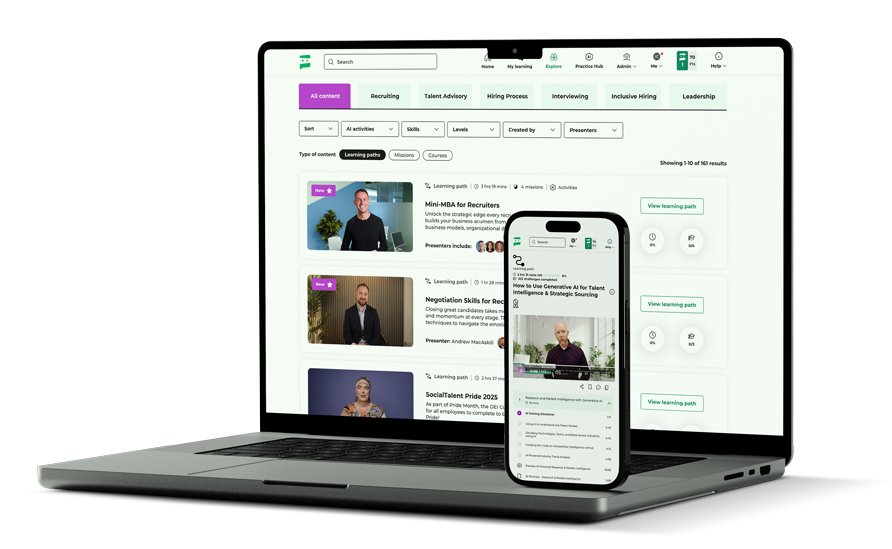
By David Deady
By 2025, Gen Z will account for around 25% of the total global workforce.
After being brought up through particularly challenging times, this burgeoning generation has a completely unique outlook and expectation from the workplace. So much so that recruiters are already flagging how attracting and retaining this cohort of talent is going to be one of their greatest challenges over the coming years.
And it’s not surprising. Described by Deloitte as being “radically different”, how Gen Z defines what success looks like in a career eschews the norm. They are the most diverse, tolerant, educated, and socially committed generation – and it’s these driving forces that make hiring Gen Z quite the complex task for talent acquisition folk.
Conventional and traditional processes simply aren’t as effective. Gen Z values inclusivity, authenticity, and genuine purpose. And as this generation’s presence is becoming more increasingly felt, it’s time for organizations to equip their recruiters with the kind of strategies designed to appeal. Let’s get into it!

Who are Gen Z?
Born between the years 1997 and 2012, Gen Z are the generation who grew up in the era of smartphones and social media. Defined by both the conveniences and pitfalls associated with rapid technological advances, shifting societal norms, and access to an instant and eye-watering amount of information, Gen Z have the world at their fingertips.
Unafraid of their voice and making change, this generation places a huge emphasis on transparency, mental wellness, diversity, and social responsibility. And as they begin to enter the workforce, they are more likely to seek employers whose values align with their own. As the 2024 LinkedIn Future of Talent report states:
“Having come of age during a global pandemic, social justice movements, and a climate crisis, Gen Z cares deeply about working for companies that share their values and won’t compromise their principles for a job.”
Attracting Gen Z Talent
When it comes to inclusive hiring, most people’s thought processes go to areas like neurodiverse accommodations, or building talent pools from margnialized communities. But age is something that is often neglected in this conversation – on both ends of the spectrum.
Attracting Gen Z talent requires a mindset shift. What appealed to Millennials or Gen X, won’t have the same impact and we must reconfigure the hiring process to reflect this.
1. Leverage Authentic Communication
“Build it and they will come,” as the mistakenly referenced ‘Field of Dreams’ quote says! But it holds true here. Talent acquisition professionals have to create a hiring process that embodies who Gen Z are if they are going to have any chance at attracting this cohort. And it starts with technology and social media.
To effectively reach Gen Z, companies must maintain a robust online presence. This includes having an engaging social media footprint, user-friendly websites, and a seamless digital application process.
This is step one. Beyond this, it’s about what you’re saying on these platforms. Recruiting Brainfood’s Hung Lee argues:
“Gen Z isn’t interested in snazzy marketing collateral. Employer branding efforts need to go away from post-production towards revealing employees’ work and experience at the company to a wider audience.”
Gen Z wants to know what it’s actually like to work in your company, and they will find out regardless! Being the digital natives that they are, they will have no trouble sourcing poor reviews on Glassdoor, finding troublesome think-pieces online, and even directly messaging current employees to get a lay of the land.
So if you’re not building authenticity into your online presence and outreach, you may struggle to entice this generation into the fold. It’s about relating to this talent, showing them that they can be part of your story as a company. Check out sourcing expert, Glen Cathey’s top tips on this:
2. Promote Diversity, Equity, and Inclusion
According to a recent HiBob report, 83% of Gen Z employees say that an organization’s stance on diversity, equity, inclusion, and belonging is significant for them when choosing where to work. And as the most diverse generation yet, they expect this to be reflected in their workplace.
This means that organizations should not only have DEI policies but actively practice them. So what does this look like from a recruiting perspective?
- Ensure job ads are inclusive and don’t alienate talent.
- Encourage applications from marginalized communities.
- Include a diversity statement and links to further DEI initiatives.
- Optimize your careers page for accessibility.
- Have DEI and Interviewer Training as standard.
- Ask about reasonable accommodations before the interview.
- Keep interview panels diverse.
There is a bit of a watershed moment here. For so long there has been a call to move DEI from being a nice-to-have initiative within the workplace into something that is seen as an integral part of the make-up and success of an organization. Could Gen Z’s arrival spur this into genuine actuality?
Learn more: Download our FREE E-Book on Inclusive Hiring
3. Flexibility and Balance
Writing for the Washington Post, Julie Lee, who is the Director of Technology and Mental Health at Harvard Alumni for Mental Health, states that:
“What Gen Z wants is to do meaningful work with a sense of autonomy and flexibility and work-life balance, and work with people who work collaboratively.”
Rather than going with the grain, Gen Z isn’t afraid to ask for what they want. This generation values flexibility and balance, not only as a benefit, but as a standard way of working. In fact, according to research, employers who are considered to have flexible work policies are 16% more likely to have candidates accept their InMails and 29% more likely to receive an application.
For recruiters and TA professionals it’s about connecting the dots and demonstrating to business stakeholders how the talent pool and potential shrinks without having a defined and marketable culture of flexibility and balance. However, it’s a tall task to promote this when sourcing and hiring candidates if it doesn’t exist. As we mentioned earlier, Gen Z wants authenticity – and if you’re promising a work atmosphere that’s guided by flexibility and it doesn’t actually exist, they won’t think twice about walking. Remember: 74% of Gen Z employees are willing to change jobs in pursuit of a better work-life balance.
So be the Talent Advisor. Bring the data and anecdotes to show how increasingly important it is to lean into these characteristics, rather than fight against them.
Learn more: How to Become a Talent Advisor
4. Career Development and Growth
While salary and compensation can never be overlooked as a key concern for any cohort, no generation has been so concerned with career development and growth than Gen Z. According to LinkedIn, they are 36% more likely to prioritize this than Millennials, Gen X, and Baby Boomers.
So to attract Gen Z, you have to promote your organization’s culture of learning. Do employees get credit towards L&D? Does your company already offer continuous learning opportunities? Do managers regularly encourage their direct reports to up-skill? What does promotion look like in the organization – is there a pathway for this? A flourishing culture of learning encapsulates all of this and it’s your job as a recruiter to make sure that your candidates are made aware.
Gen Z are eager to learn and advance, so putting this EVP up-front can help attract them. One hugely beneficial offering could also be around mentorship – Gen Z are young and could hugely value a space where their development is taken seriously.
Learn more: 6 Ways to Build a Culture of Learning
Conclusion
As the workforce evolves, it’s imperative to recognize and adapt to the unique characteristics of Gen Z, a generation set to make up a quarter of the global workforce by 2025. Raised amid technological revolutions and major social changes, Gen Z values transparency, mental wellness, diversity, and social responsibility – traits that deeply influence their career choices.
Employers must therefore shift from traditional recruitment strategies to more inclusive, flexible, and technology-driven approaches. Authenticity in online engagement, active promotion of diversity, equity, and inclusion, and a commitment to work-life balance and continuous learning are not just attractive to Gen Z; they are essential.
To succeed in attracting this dynamic cohort, organizations must embody these values, fostering an environment where Gen Z feels their ideals are not just understood but celebrated.


